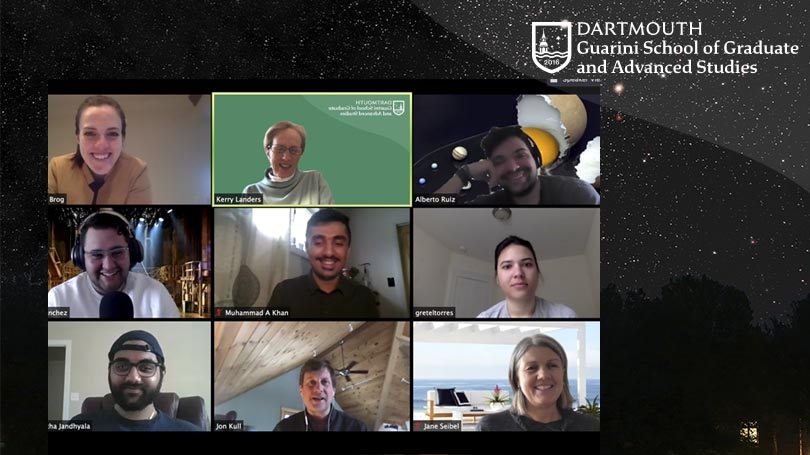In light of the recent discussions on campus around dismantling structural racism, a number of organizations have evolved to capture the momentum of the movement and take the conversation into the community. The students in the Guarini School are ideally placed to take the lead on these initiatives, thanks in part to the enthusiasm and dedication of the recently appointed Guarini Diversity Fellows.
Launched in January this year as a pilot study, the Guarini Fellows program offers leadership experiences for students who are interested in deepening their engagement across the following key areas: Activities, Communication, Diversity, and International Student Mentoring. The current fellows are Sidhartha Jandhyala (Activities Fellow, Thayer), Alberto Ruíz (Diversity Fellow, Thayer), Hector Sanchez (Diversity Fellow, Molecular and Cellular Biology (MCB)), Gretel Torres (Diversity Fellow, MCB), and Muhammad Abubakar Khan (International Student Mentoring, MCB). The Communications Fellow position is currently vacant.
"The program was started to foster a partnership between graduate students and the Guarini school," explains Assistant Dean for Recruiting, Diversity, and Marketing & Communications, Jane Seibel. "This leadership development program and partnership has been so incredibly valuable even in just the few months since it started."
Over the past several weeks, Ruíz, Sanchez, and Torres have organized and led several Town Hall meetings for faculty, staff, and students in specific Guarini School programs. Attendees are invited to share their personal experiences of racism and knowledge of diversity to co-create a more just and anti-racist climate on campus. There has been one community-wide Town Hall, with more planned.
Sanchez says the Town Hall meetings, "have created an open space for dialogue between faculty and graduate students from different departments. They have been emotional, difficult, and constructive, but most importantly, I value the respect that we're building as a community. We're finally having difficult conversations about the role of systemic racism on our campus and in society, which is the first step toward addressing the underrepresentation of student and faculty recruitment. I hope we continue to facilitate respectful conversations between all members of our community to address pressing issues."
Dovetailing with the efforts of the Diversity Fellows, Ruíz worked with the Graduate Student Council (GSC) to create the Committee for Addressing Racism and Equity (CARE) in June. The committee is tasked with assessing policies relating to equity and anti-racism and evaluating the current environment to uncover new ways to develop equitable practices for all.
GSC president Eva Childers notes that, in addition to evaluating current practices, the committee will also present a list of actionable items. "The end goal of CARE is to write a letter that includes these actionable implementations that will be signed by students, staff, faculty, and alumni once approved by the GSC," she says.
The CARE co-chairs are Alexandria Casteel, from the Ecology, Evolution, Environment and Society (EEES) program; Divya Ravi, in the Program in Experimental and Molecular Medicine (PEMM), and Sarah Steimel, also a student in PEMM.
Speaking of her interest in serving on the committee, Ravi says, "I want to understand what prevents students and faculty members from diverse backgrounds from coming to Dartmouth. A committee that addresses and questions whether the policies in place actually serve a diverse group is something I really wanted to participate in."
In addition to advocating for diversity and inclusion on campus, the Fellows have responded with flexibility, as their work has pivoted to online and virtual engagement. They have energetically supported the development of an online orientation program for incoming students in the fall and have held several virtual meet-and-greets.
"We are really excited to have the Guarini Fellows working with us in their various roles," says Dean of the Guarini School, Jon Kull. "Not only are they able to gain valuable leadership experience, but they bring the student perspective into our office, and our conversations about policies and initiatives, on a daily basis. Given that one of the main purposes of the Guarini School is to support graduate students and make sure the graduate programs are as strong as possible, the insight and ideas the Fellows have already proved to be invaluable."
